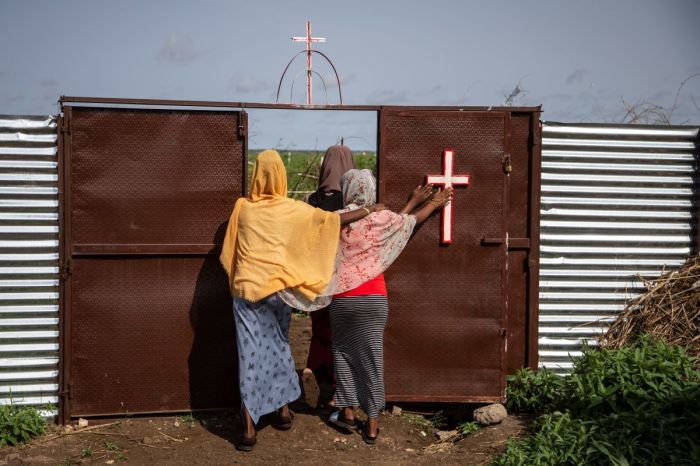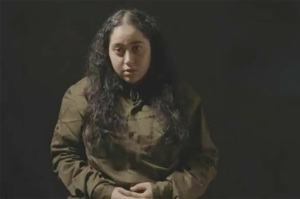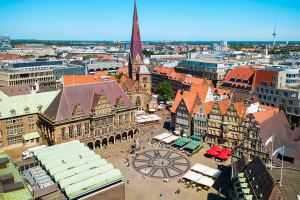'Upending civilian life': Christians impacted by displacement amid rise of terrorism, conflict

Christians were significantly impacted amid widespread displacement in 2024 and, in some countries, were targeted or killed by warring parties and Islamic terror groups, according to an extensive report from a religious freedom watchdog organization.
The United States-based International Christian Concern released its "2025 Global Persecution Index" Thursday, highlighting "the most egregious violators of religious freedom in 2024" and "cataloging the countries, terrorist organizations, and government leaders whose actions have systematically targeted Christians."
Among global trends that emerged or intensified in 2024 was mass displacement in conflict-ridden regions like Sudan and Myanmar, as well as countries in the Sahel region of Africa impacted by the rise of Islamic extremism.
In Sudan, more than 8 million people have been displaced since war broke out in 2023, in which both warring sides have "attacked religious sites, killed religious leaders and disrupted religious practices across the country."
The report cites statistics from the United Nations, finding that about 3.3 million people residing in the Sahel countries of Burkina Faso, Mali, Mauritania, and Niger were displaced at the beginning of 2024 as the region has been gripped by the rise of Islamic terror groups taking the place of failed governments.
"While this displacement has affected followers of every religion, terrorist groups often select Christians and disfavored religious groups for targeted violence and are particularly vulnerable to displacement," the report stated.
"Across the Sahel, terrorism and militant unrest is upending civilian life and rendering regular religious practice dangerous or impossible," an ICC staffer commented.
The Sahel region of Africa includes the aforementioned countries as well as Chad, Eritrea, The Gambia, Guinea-Bissau, Nigeria, Senegal and Sudan.
Throughout northern Nigeria, Christian communities are often attacked by Islamic extremists such as the Islamic State West Africa Province and radicalized Fulani militants, leading to the killing of thousands in recent years.
The report outlined how the United Nations Office for the Coordination of Humanitarian Affairs reported that 358,000 people residing in the violence-plagued Democratic Republic of the Congo were displaced in January 2024 alone. The ICC attributes the unrest in the African nation in part to the Allied Democratic Forces, a militant group with "jihadist ideology."
"While the DRC's Christian-majority population means that some attacks on Christians may be unmotivated by religion, the ADF is known to target churches and church leaders," the report noted.
The DRC and the Sahel were countries or regions placed into the "red zone" by the religious freedom advocacy group, a category reserved for jurisdictions "where Christians are regularly tortured or killed for their faith."
Other countries that made it into the "red zone" are Nigeria, Somalia, Eritrea, Afghanistan, North Korea and Pakistan.
Four countries were classified as part of the "orange zone," meaning that their governments "severely oppress the rights of Christians." Countries in the "orange zone" are China, India, Iran and Saudi Arabia.
Azerbaijan, Egypt, Indonesia, Malaysia, Myanmar, Nicaragua, Russia and Vietnam were placed into the "yellow zone," reserved for jurisdictions where "Christians endure attacks, arrest, and oppression."
While much of the report painted a bleak picture of the state of religious freedom worldwide, the document pointed to "popular discontent with repression" as a positive development in 2024.
The report mentions the Spring 2024 elections in India, where the ruling Bharatiya Junta Party "found itself with a significantly reduced electoral mandate" that forced it to "form a coalition with several other parties to assemble a government in Parliament."
The ICC lists the BJP as one of the "groups/entities" that is "causing the most harm" in India, stressing how it "is known for championing a narrow view of Indian identity based on the idea that to be truly Indian is to be Hindu — a view that necessarily reduces Christians and religious minorities to second-class status."
While acknowledging that "the long-term implications of this change have yet to be fully understood," the advocacy group anticipated that following the 2024 elections, "the BJP's nationalist agenda will be hampered by its coalition partners, which are significantly more secular."
Another example of "popular discontent with repression" materialized in Myanmar, where a military junta led by extremist Buddhists known as the Tatmadaw continued to rule the country after overthrowing its democratically elected government in 2021.
ICC observes that the "junta's violence has coalesced the country's many ethnoreligious minorities, who chalked up many impressive military victories against the junta in 2024."
"Research from the Special Advisory Council for Myanmar suggests that anti-junta militia gains have reduced the area under solid Tatmadaw control to 17% or less," the report added.
In Iran, the ICC cited the election of "relatively moderate politicians, such as Masoud Pezeshikian in 2024," as a "popular uprising" that may suggest that "the [theocratic] regime's control is not absolute."
Ryan Foley is a reporter for The Christian Post. He can be reached at: ryan.foley@christianpost.com





























